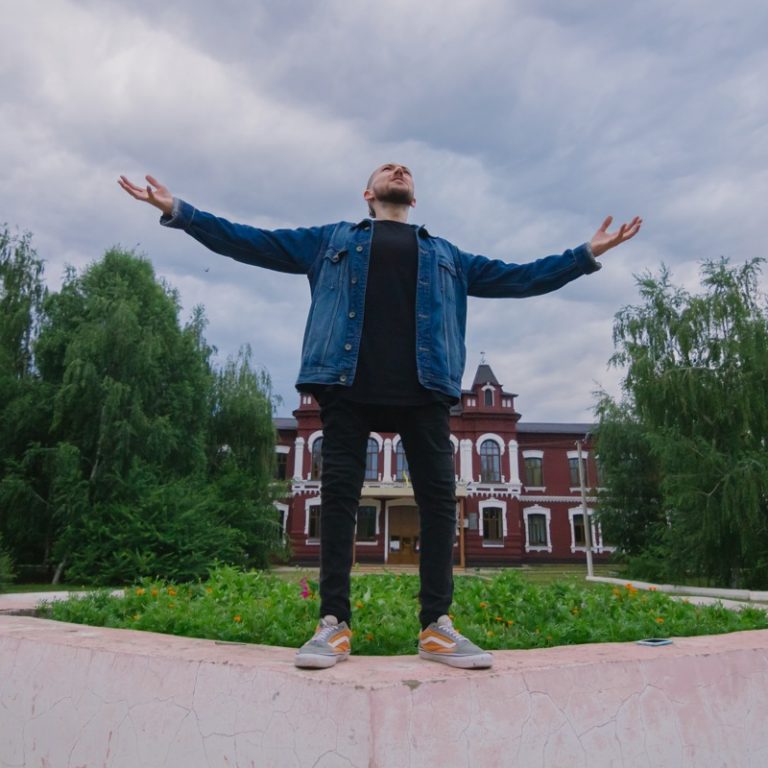In 2014 an influential academic library moved from Luhansk, which was occupied by Russian terrorist groups, to the small city of Starobilsk. All they had back then were documents, a rubber stamp and no books at all. In order to survive, the library had to change. After a few years, activists of the library found premises and turned a classical book depository into a cultural-educational platform, Good Library, which is now considered a center of Starobilsk cultural life.
Starobilsk, 2016. People are dancing in a small space, surrounded by books. All of them are wearing earphones and listening to music, which is played by an online radio DJ. The first Good silent disco is taking place in the Good Library. After the event the library gained significant popularity among citizens.
This follows an urgent decision about moving from occupied Luhansk and two years of volunteer training work without their own premises and book collection. Ahead are numerous initiatives, other silent discos with libraries from all over Ukraine and the transformation of the reading room into the cultural-educational centre with the potential to change the city.
The mastermind behind the silent party in Starobilsk library is musician and activist Serhii Letuchyi. He recalls:
“At the party we were all dancing at the same time, everyone in their own library. It was truly inspiring. You realize that you are dancing in Starobilsk library and together with you there are young people dancing in other cities. In libraries, to be exact. In this way, we managed to show Ukrainian libraries, which are mostly conservative ones, that the library is about more than just books.”
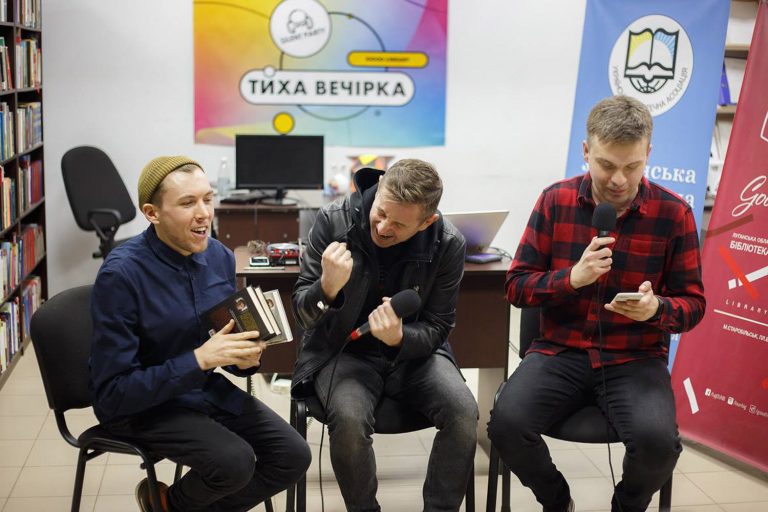
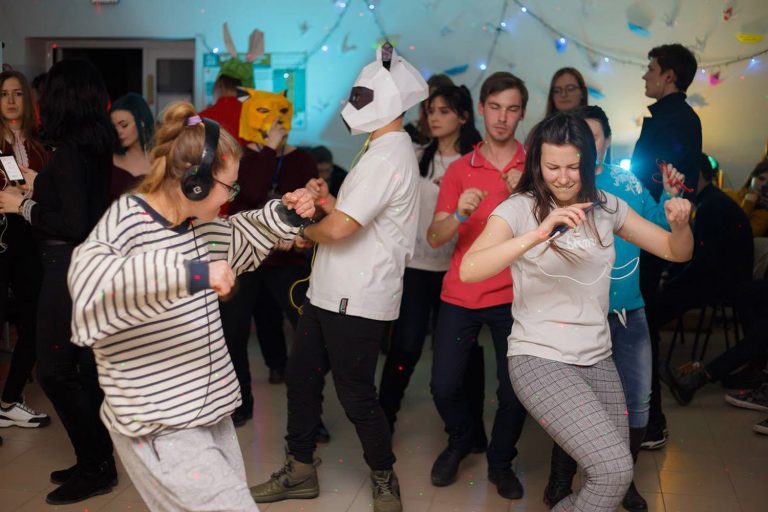
slideshow
Silent discos are only one of the numerous initiatives that Good Library is carrying out. There are always seminars, training courses, movie screenings, programming courses, other parties, and book presentations taking place.
A library functioning as a book depository, an art and coworking space at the same time is quite common abroad. In Ukraine it is also gaining in popularity nowadays. Public libraries often become community centers, where locals discuss important issues and study as well.
For instance, the academic-pedagogical library in Mykolaiv has the motto “Lifelong learning”, and besides meetings, reading discussions and book presentations, conducts various classes for seniors in the computer center “Third Age University”. The Lviv Regional Library for Children is another case. For many years it has been implementing projects for young readers such as a literature studio, a children’s illustrations workshop, an origami studio, a children’s bookstore, educational lectures and many more. Another innovative public library opened its doors in 2018 in the city of Trostyanets in Slobozhanshchyna. Now it is a modern public space with a games room, an events space, a coworking and a social cafe.

Luhansk. A library of dreams
The Regional Universal Scientific Library of Luhansk has been operating for more than 100 years. It was established for the first time in 1897 by the zemstvo (a local government institution in the Russian Empire) as a free public library and reading room. Initially its book collection consisted of 2,000 items. Most probably, the majority of the books were donated by citizens of the city, which was at that time called Luhanske.
During the Second World War book depositories were almost all destroyed, but by 1953 there were already 234,000 books. Within the book depository a music library was established in Luhansk with sheet music and a record library. At the time it was the only one of its kind. 20 years later, in 1973, the library received academic status. Its collection had grown to more than a million books. When it moved to Starobilsk in 2014, the entire collection was left on the occupied territory.

Prominent librarian of the Good Library Inna Rybiantseva was head of the library for 34 years. For 32 of them she was working in the very same premises of the Luhansk book depository.
“You know, I still see that Luhansk library in my dreams. All the people who came and visited us there used to say: ‘God, it is so airy in here, so easy to breathe’. Certainly, our reading halls are big, five-six metres high, with big windows, they are very spacious and light. Our readers loved to spend time in our library, they could breathe easy there. And this, of course, is my pain. I dream about it, because it is my second home.”
Luhansk Regional Academic Library became one of the first libraries in Ukraine to switch to automated processes. Led by Inna Rybiantseva, the staff aimed at developing the library. They travelled a lot to learn from the experiences of other countries, like the USA and Germany.
“People often asked me: ‘Can you tell me if others have already introduced automation into libraries?’. ‘No, we will be the first’. But I simply want to make it happen in our library, I do not care whether others have or haven’t done it already. So, of course, we managed to do a lot in terms of automation before the war started, really a lot.”

Current head of Good Library Svitlana Moisieieva back then was deputy director of automation:
“In Luhansk we had a very powerful system of 118 computers. We created a digital catalog of books, and we had dreams about a corporate catalog for the whole region. It all broke off when the war started.”
On 27th of April 2014 militants seized the administrative building of the Security Service of Ukraine in the Luhansk region and soon after, the building of the state administration. Inna recalls that one day people with machine guns entered her office and asked why she was not supporting the Russian combatants.
“I said: ‘I am sorry chaps, but I am 74 years old. For 34 years I have been working as a head of this library. Where will you take me? I have seen everything: communism, white, red and green armies. So we will see how it goes and what you will do. But if nothing changes, I will not be able to work with these people, I just won’t.’”
Even though shots could already be heard in the city, the library staff kept working. The head of the library contacted the regional department of the Ministry of Culture on the issue of closing the library and preserving the collections. But they were not able to give any instructions. So Inna Rybiantseva decided to suspend the library’s functioning indefinitely.
On 17th July 2014 she took library documents: the charter, regulations, the rubber stamp and left Luhansk. She stayed in her native Starobilsk and believed that soon they all would return.

Photo by Mykola Molozhon
Starobilsk. Settling in without books
Starobilsk was founded in 1686 on the bank of the River Aidar. There are nearly 17,000 people living here. It is well known for its history, since the commander of the Revolutionary Insurrectionary Army of Ukraine, Nestor Makhno, stayed here. According to legend, he hid his treasures near Starobilsk.
The city itself also has close ties with literature. Two well known Ukrainian poets, Ivan Savych and Ivan Svitlychnyi, lived in Starobilsk for some time. It was also mentioned in the famous novel by Illia Ilfa and Yevhen Petrov “The Twelve Chairs”. Another famous modern poet, Serhii Zhadan, was born in Starobilsk.
Starobilsk has a long history of librarianship. The Central District Library of Starobilsk was first mentioned in 1896 as a free public library, opened by a branch of the Literacy Society in Starobilsk. From the very beginning, there were various concerts, literary evenings and balls taking place.
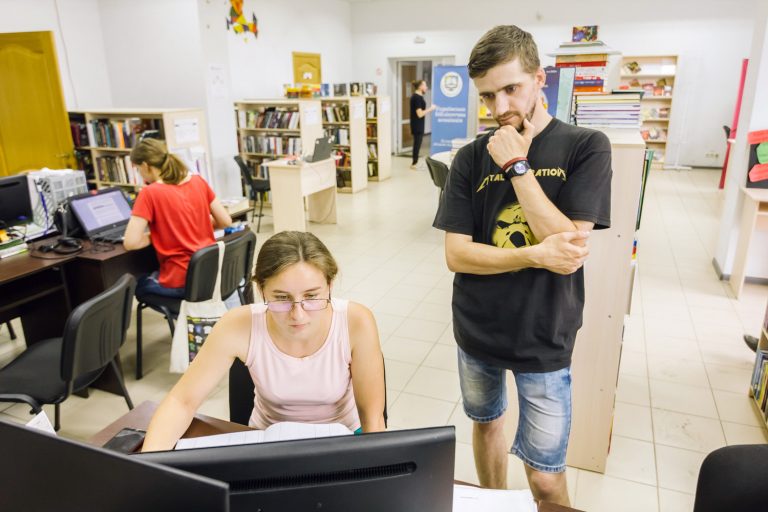
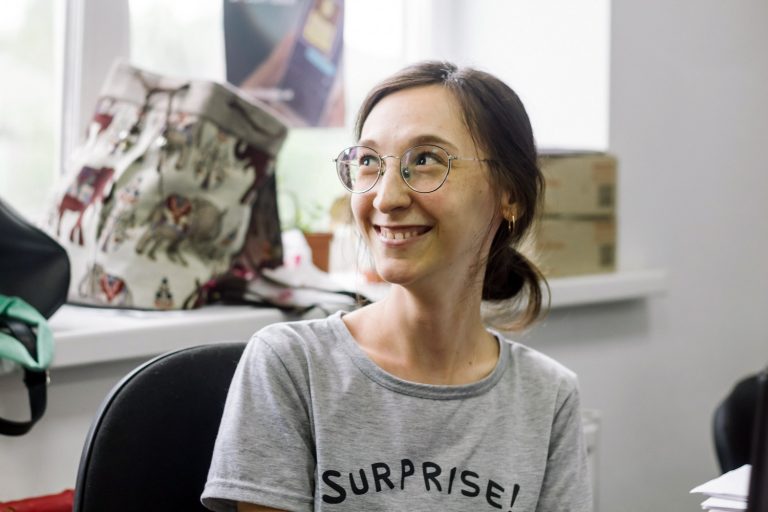
slideshow
Inna Rybiantseva says that the location of the city was suitable for the creation of a research center:
“Without having funds, proper material and resource bases, all we can do now is engage in research work. For research, you must be located in a place to which others will have easy access. Starobilsk is located in the center of the northern part of the region. All roads, regardless of the direction, run through Starobilsk. So this is what I said: either I open a library in Starobilsk or someone else can do so in a different city.”
To begin with, Inna Rybiantseva was striving to create a research center for library workers. The regional government instead offered her to direct the regional library. And she agreed:
“Fine, let’s open the library. At the same time I was thinking, Inna, how are you supposed to do that? No funds, no resources, nothing.”
In the beginning, the team was working in the premises of another city library, but by September 2016 they had already managed to rent a place, which is still used today. At the same time they started collecting books from scratch. The history of Luhansk regional library then repeated itself: a good few books were donated by locals. All of them were new publications, with the oldest dating from 2012. Svitlana Moisieieva recalls:
“We were receiving books almost every day. There were very touching moments, when someone was calling from occupied Luhansk and saying something like: ‘You are our library and we do not recognize the republican one that has been opened under the occupation, within the temporarily occupied territories of Ukraine. I cannot send you any books, the post office is not working, nothing is working, actually. Can I transfer you money at least?’”
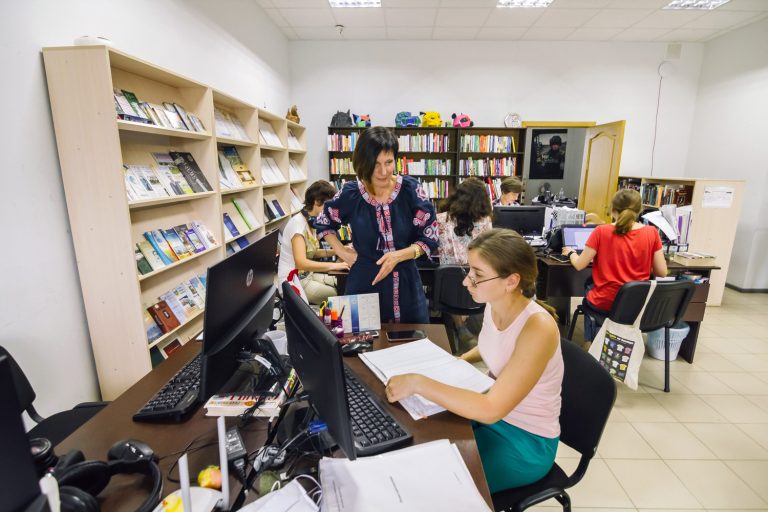
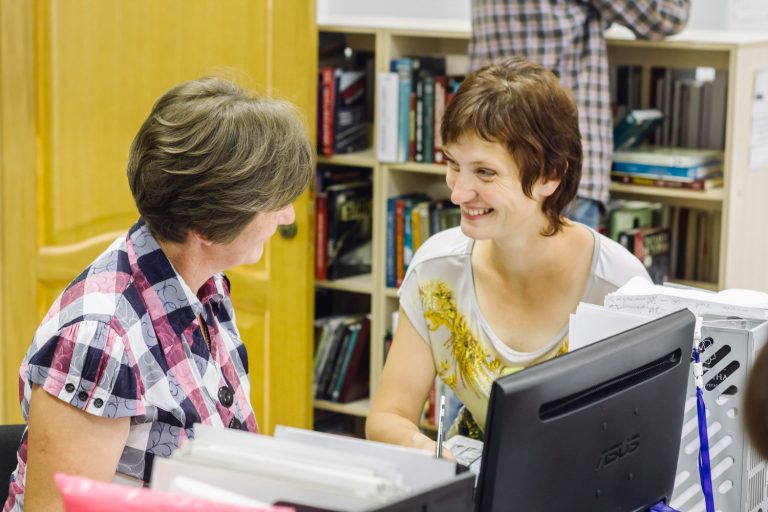
slideshow
Svitlana Moisieieva is proud of her team, which has been formed in these years around Good Library, and she is ready to share her experience with other regional libraries:
“I was so lucky with people, because everybody who joined our team had a desire to contribute. Thank God, it keeps growing A few years have passed, people grew, gained experience and are now ready to represent Starobilsk. To my mind, we raised specialists at the regional level. We, as an e innovative library, are constantly coming up with new ideas and trying to spread them through the region, teaching other librarians. And they are reaching out to us.”
The library had been receiving help also from patrons, including publishers and bloggers. By the end of 2016 there were around 3,000 books in the library.
Local young people have also joined the team and now the library has its own SMM specialists, event managers, a photographer, and a designer. It also has a website, an official Facebook page and has generally become more ‘visible’.
“Ukraine now knows that a relocated library exists that continues to operate and do great things.”

Photo by Denys Cherviak
Silent discos, murals and inclusion
Musician and public activist Serhii Letiuchyi met the Good Library team back in 2015:
“I saw that the library was more than books and I simply wanted to turn it into a place where youth could gather, carry out projects, hold some events, both literary and educational ones.”
The proponent of the silent discos spoke about his first experience cooperating with the library:
“We held the first party in order to draw attention to the library, to announce that it actually exists, is functional, it is pro-Ukrainian and now based in Starobilsk. It worked out pretty well, I should say. And I had no idea what I had started. People were calling me and asking what the hashtag meant. And I could not stop them from innovating and improving.”
Likewise with the second party in March 2019, we managed to attract organizers from other cities and it already covered 25 libraries in 17 Ukrainian cities. The all-Ukrainian team was formed, which was gathering needed resources and was searching for volunteers locally. For instance, during the second “silent disco” Radio Skovoroda, DJ Sunny Boy and Serhii Zhadan (see above) visited Starobilsk. Each library held a video broadcast, the organizers showed what was happening in other cities. Party guests were dancing in 3D masks.
The third “silent disco” took place in December 2019 and aimed at drawing attention towards inclusion and the availability of library spaces, with the slogan “Party for everyone”. This time the event took place in 41 libraries in 37 Ukrainian cities.
The Kyiv Museum in the Dark “Three in the morning” also joined the party and prepared its own inclusive programme. Translation of the event in sign language was additionally provided along with subwoofers in the room (a speaker system) for deaf people, who were dancing with the help of floor vibrations.
“What is truly inspiring is that this initiative was launched from a small front-line town in eastern Ukraine, which gathered together 37 cities from all around Ukraine at the same time. That is how we are developing the library as a free space for free people.”
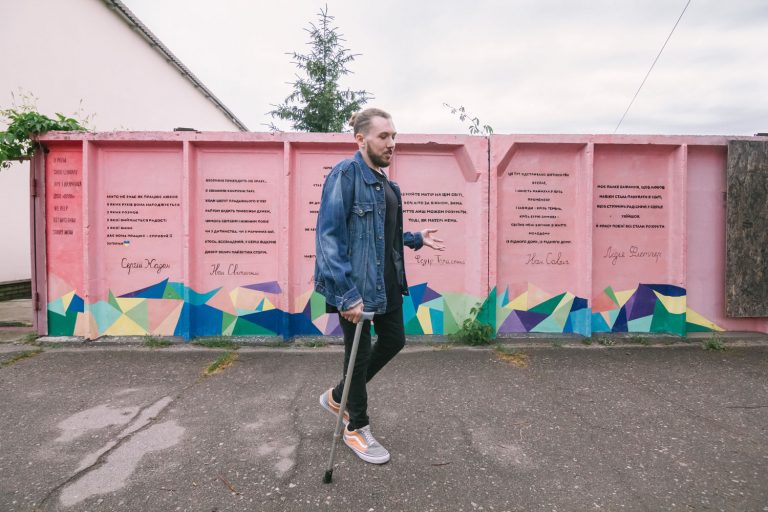
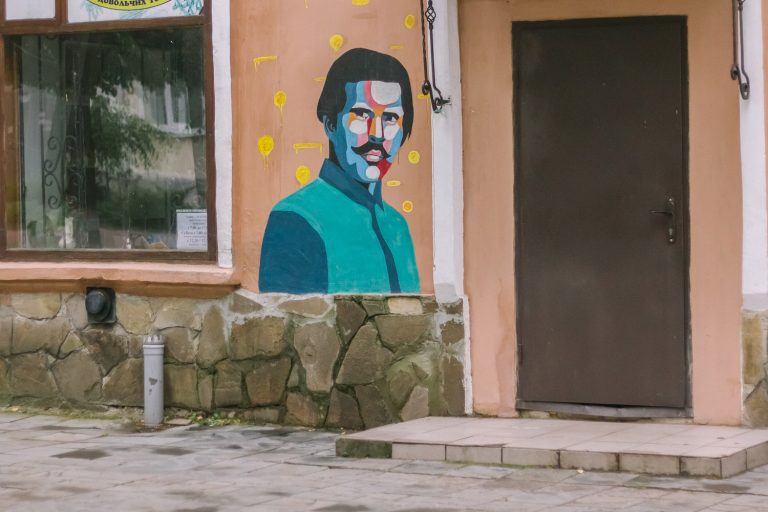
slideshow
Serhii shows the murals on the city walls. On one of them there is an image of Nestor Makhno (locals call him Freddie Mercury, since he looks quite similar to the Queen frontman). Serhii also shows the building where Ilf and Petrov used to live and to whom another mural is dedicated.
The creation of murals in the city was one of the Serhii`s initiatives. He gathered volunteers and artists from Luhansk University who would later create seven murals in Starobilsk. Serhii Letuchyi says that the creation of a mural is accompanied by concerts and public discussion:
“We developed a sketch, set up a projector and we just filled in the painting, like in a coloring book. We additionally held a small concert and a performance: I invited people who told different stories about Makhno. While painting, we had a chance to talk to the citizens of Starobilsk about Makhno. We mainly asked them: ‘What do you think about Makhno?’ and the answer was either: ‘I know nothing about him’ or ‘He was a terrible person’. I didn’t want it just to be about painting a mural, but also a party, communication, more activities.”
In 2014 Serhii was travelling around Ukraine, spreading stories about Starobilsk, and after the journey he shared his experience of visiting other regions with locals. He says that back then “Ukrainians didn’t know each other at all”.

Serhii has a disability and has initiated various inclusive projects in the city oriented on disabled people’s needs. In the future he wants to see the library become even more inclusive than it is now, so they can implement different ideas:
“I want the library to be a big, comfortable and inclusive space, so everyone — the youth, children, elderly people, people with disabilities — can come and visit it. I want the library to have many locations and serve as a free space. You know, the library for me is a bridge that connects people and through which you can share knowledge and culture.”
supported by
Material prepared with support of United States Agency for International Development (USAID)


